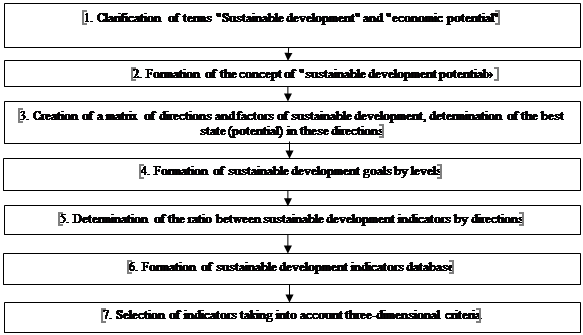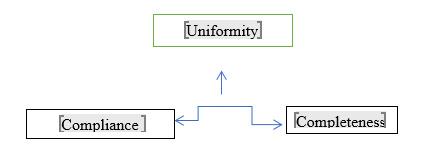Abstract
The problem of sustainable development is important for the comprehensive development of countries and the world as a whole; it becomes the core of the economic policy and all strategic decisions of states. Ensuring sustainable development is one of the most important functions of individual enterprises and a country as a whole. The need to achieve sustainable development has been repeatedly proven by developed countries, but there are difficulties in the integrated assessment and sustainable operation of industrial enterprises in the context of Russia's accession to the WTO and the globalization of world economic relations. These relations are determined by macroeconomic factors and often cannot be regulated by enterprises themselves. Companies often do not understand the concept of "sustainable development" properly; indicators that determine the sustainable development of companies are reduced to indicators that describe the companies’ activities not taking into account the potential of their development. Evaluation indicators do not reflect the impact of company's activities on its sustainable development. Ensuring sustainable development of companies in Russia is to increase their profits, so the main share in the mass of indicators belongs to economic indicators. Besides, there is no single methodological approach to the integrated assessment of sustainable development, based on quantitative assessment indicators. Although there is number of non-profit organizations in Russia which are trying to solve methodological issues of sustainable development, but there isn’t still a comprehensive systematic approach that brings together all the efforts of these organizations. This fact determines the relevance of the study.
Keywords: Sustainable developmentconceptindicatorsefficiencypotential
Introduction
Today, "sustainable development" is gaining popularity, both at the macro level (regional level) and at the level of companies. In Russia, there are some documents regulating sustainable development aimed at improving the level and quality of life, based on the main aspects of the world concepts (The United Nations Commission on Sustainable Development (CSD)); enterprises have a separate policy in the direction of sustainable development, but there is not any single system of indicators for assessing the potential of sustainable development and there is no specific methodology for selecting indicators themselves. All this leads to the fact that the concept of "sustainable development" and the indicators used to assess the situation in the world, country, industry, vary greatly, depending on the organization (Shedko, 2016). Having studied the characteristics of the term "potential" and the concept of "sustainable development", we can conclude that it is necessary to supplement and clarify the definition of "sustainable development of the company”, taking into account the possibility of its assessment through the potential.
Currently in the world it is generally accepted that the central role in the concept of sustainable development belongs to the issues of accounting long-term social and environmental consequences of taken economic decisions that will improve energy efficiency and productivity without increasing the resource load (Kuznetsov, Garina, Andriashina, Kozlova, & Yashin, 2016; Voynilov et al., 2017). Since the economic effect can be justified only if there is a certain balance between the interests of the economy and the environment. And taking into account the analysis of indicators of various large oil companies, as well as the disunity of the goals of "sustainable development" at the world, state and industry levels, the authors propose a scheme for the formation of common indicators of sustainable development (figure
Problem Statement
Russian companies often misunderstand the concept of "sustainable development", simply including it in the company's mission and believing these thing are the same:
- indicators, that determine the sustainable development of enterprises, are reduced to indicators that simply describe the companies’ activities and therefore do not include the potential for their development;
- industrial enterprises often speak in their reports about the development potential, believing that this is sustainable development, but use only static indicators that reflect only the current state;
- indicators do not reflect the impact of the company's activities on its sustainable development;
- ensuring the sustainable development of companies in Russia means an increase in their profits, so the main indicators are economic ones;
- there is neither integral evaluation nor quantitative indicators to assess sustainable development.
Research Questions
To achieve this goal, the authors solved the following tasks:
- clarification of the concept of "sustainable development»;
- substantiation of the applicability of conceptual approaches, in particular economic potential, to the assessment of sustainable development of fuel and energy companies;
- development of a scheme of the indicators formation for the assessment of sustainable development;
- formation of a model for assessing the potential of sustainable development
Purpose of the Study
The purpose of this study was to improve the methodological support for assessing the sustainable development of companies through the formation of a comprehensive system for assessing sustainable development.
Research Methods
Theoretical and methodological basis of this research was formed by foreign international works on various issues of sustainable development. A study of the influence of sustainable development indicators on the assessment of the companies value was carried out by Sokolov and Chulok (2016), Pouris and Raphasha (2015) and others. To solve the research tasks, the authors used principles of the system approach, methods of analysis and synthesis, comparison, grouping and classification, forecasting, expert evaluation method, analytical, statistical and graphical methods.
Findings
Sustainable development is not only a stable development that meets needs of the present without compromising the ability of future generations and their own needs, but it is also a development that takes into account all the production potential, the availability of production factors and its defining resources.
2. Formation of the concept of "sustainable development potential»
-
2. Formation of the concept of "sustainable development potential»

Based on the analysis of indicators of various oil companies, as well as the disunity of the goals of "sustainable development" at the world, state, industry levels, the authors propose a scheme for the formation of common indicators of sustainable development (figure

Source: authors.
Three-dimensionality consists of the following criteria:
Dynamics-State-Efficiency (completeness).
Compliance with goals at all levels (compliance).
Uniform correlation between sustainable development factors, economics, ecology and sociology (uniformity).
The first criterion shows the ability of the indicator to display the change over time, as well as to assess the potential effect of the company's activities. A static indicator, for example, such as revenue, does not give a complete perception of the effectiveness of the company, so the authors insist on the selection of certain indicators that reflect not only the current state, but also the dynamics and efficiency.
The second criterion tells us about the problem described above, namely, the discrepancy between the generally accepted strategic goals and the concept of company’s development, which in itself is impossible.
The third criterion shows once again that the main strategic goal of any company is to increase profits, which goes against the concept of strategic development of the Russian Federation and the world on the whole. Accordingly, the indicators that companies provide in their reports mainly reflect only the economic component of their activities, so the authors insist on an uniform distribution of indicators in the following areas: economy, ecology and social component.
For the selection of key indicators according to the authors’ methodology, a common matrix of indicators was selected: 18 economic, 22 social, 26 environmental, used by various companies to assess the sustainable development.
Having considered the whole matrix of indicators, it can be concluded that most of them reflect the effectiveness of activities, but remain static, that is, they do not reflect changes and the achievement degree of the desired state. And even if they reflect changes, they do not analyze their effect. Besides, some indicators are very generalized, that doesn’t allow using them directly for the activities assessment of companies and country as a whole. Therefore, the authors selected 9 key indicators from the whole indicators matrix, using the own methodological tools, (Table
Conclusion
Because of the huge number of indicators that different companies use to assess sustainability, the whole picture is blurred and invalid. The lack of a unified system makes it impossible to compare different companies, which has a negative impact on the desire to improve their efficiency. The authors’ methodology allows to effectively assess the level of sustainable development of companies.
References
- Kuznetsov, V. P., Garina, E. P., Andriashina, N. S., Kozlova, E. P., & Yashin, S. N. (2016) Methodological solutions for the production of a new product. In F.L. Gaol, N. Filimonova, F. Hutagalung (Eds.), Proceedings of the Annual International Conference on Management and Technology in Knowledge, Service, Tourism & Hospitality 2016 (SERVE 2016), 8-9 October 2016, 20-21 October 2016, Jakarta, Indonesia & Vladimir State University, Vladimir, Russia (pp. 59-64). London, UK: Taylor and Francis Group. https://doi.org/10.1201/9781315269146-12
- Pouris, A., & Raphasha, P. (2015). Priorities setting with foresight in South Africa. Foresight and STI Governance, 9(3), 66-79.
- Shedko, Yu. N. (2016). The system of indicators and monitoring of the sustainable development of the region. Vestnik of Moscow University named after S.Yu. Witte, Series. 1: Economics and management, 3(18), 20-26. [in Rus.].
- Sokolov, A., & Chulok, A. (2016). Priorities for future innovation: Russian S&T Foresight 2030. Futures, 80(6), 17-32.
- Voynilov, Yu. L., Gorodnikova, N. V., Gokhberg, L. M., Ditkovsky, K. A., Kotsemir, M. N., …, Fursov, K. S. (2017). Science indicators 2017: Statistical bulletin. Moscow: National Research University Higher School of Economics.
Copyright information

This work is licensed under a Creative Commons Attribution-NonCommercial-NoDerivatives 4.0 International License.
About this article
Publication Date
09 March 2020
Article Doi
eBook ISBN
978-1-80296-078-5
Publisher
European Publisher
Volume
79
Print ISBN (optional)
-
Edition Number
1st Edition
Pages
1-1576
Subjects
Business, business ethics, social responsibility, innovation, ethical issues, scientific developments, technological developments
Cite this article as:
Battalova*, A. A., Burenina, I. V., & Tulebaeva, L. S. (2020). Formation Of Comprehensive Indicators System To Assess The Potential For Sustainable Development. In S. I. Ashmarina, & V. V. Mantulenko (Eds.), Global Challenges and Prospects of the Modern Economic Development, vol 79. European Proceedings of Social and Behavioural Sciences (pp. 180-184). European Publisher. https://doi.org/10.15405/epsbs.2020.03.25
